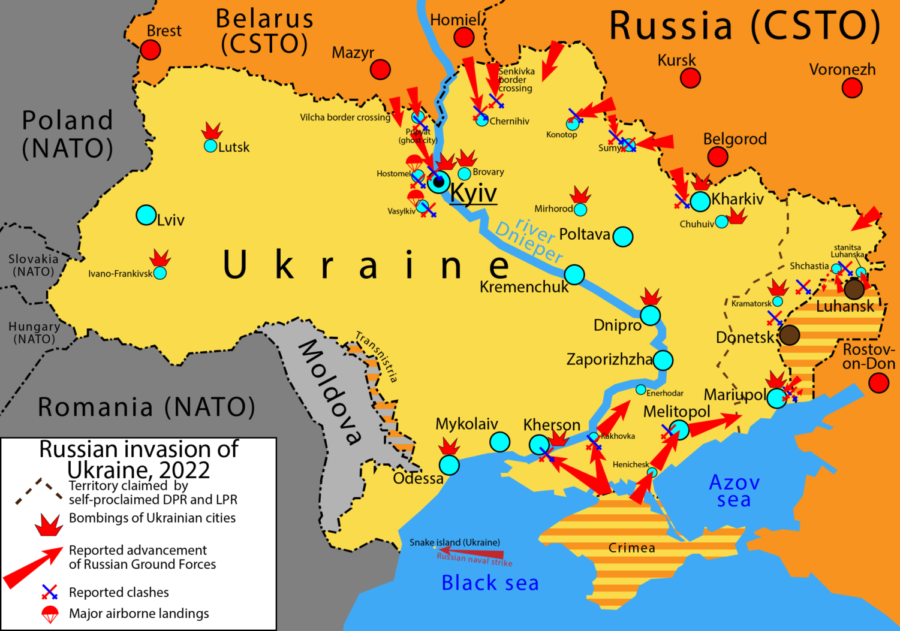Russian military forces invade Ukraine
Vladimir Putin plunged Russia into war, attacking Ukraine on all fronts.
March 5, 2022
At around 4 a.m. local time on Feb. 24, under the direction of President Vladimir Putin, Russia declared war on Ukraine and began a full scale invasion by launching air attacks and moving troops into Ukrainian territory.
This capped off a standoff since early January when Russia began to amass more than 150,000 troops along its border with Ukraine. A trigger for this renewed conflict is Ukraine seeking to join NATO, something Putin does not want. The U.S. sees the invasion of Ukraine as a power grab by Putin to weaken NATO and stability in Eastern Europe.
“When NATO expanded into Latvia, Lithuania, and Estonia (former Soviet states), right on the Russian border, that led to tensions and nervousness in Russia because then NATO and American weapons were right on the border. They don’t want that to happen to Ukraine,” AP World History teacher Mike Kennedy stated.
Putin, on the other hand, believes the West ignored Russia’s security concerns since the end of the Soviet Union and is worried about NATO being at their doorstep.
Jameson Datoc ’23, however, stated, “I don’t think Russia is afraid of NATO, and it looks like Russia is willing to do whatever they can to get what they want.”
Tensions increased exponentially in February. On Feb 21, Putin recognized the independence of the Donetsk and the Luhansk separatist republics in the Donbas region of Eastern Ukraine and sent troops into those regions as “peacekeepers.”
On Feb. 24, the Russian invasion of Ukraine began with Putin announcing on Russian state TV a “special military operation” and launching missiles to key Ukrainian cities like the capital Kyiv. It was a split screen moment
with Putin announcing the invasion, just as the U.N. Security Council was holding an emergency meeting. The Ukrainian ambassador at the U.N. told his Russian counterpart, “There is no purgatory for war criminals. They go straight to hell, Ambassador.”
As of press time, the Russian forces have only captured Chernobyl and one major Ukrainian city: Kherson, but have not established aerial control. This is due in large part to a strong Ukrainian resistance to the Russian offensive. A fighter pilot nicknamed the “Ghost of Kyiv” has single-handedly brought down six Russian fighterplanes since the beginning of the invasion and a 40 mile Russian military convoy heading towards Kyiv has been stalled.
Russian cruise and ballistic missiles have been launched mostly at urban areas. Ukraine’s president Volodymyr Zelenskyy has stayed in Ukraine, calling on all civilians to fight against Russia.
Local cease fires were agreed to on March 3 to allow civilians to evacuate.
At all this, the United States has stated that it will not send troops to fight in Ukraine, but it, along with the EU, has imposed strong economic sanctions on Russian banks and banned Russia from SWIFT. This has led to the Russian ruble crashing as the U.S. seeks to limit Russia’s ability to be a part of the global economy.
At the State of the Union address on March 1, with the Ukrainian ambassador present in the House chamber, President Biden stated, “Putin might circle Kyiv with tanks, but he will never gain the hearts and souls of the Ukrainian people” and closed U.S. airspace to Russian aircraft.
Civilians have been impacted by the crossfire. Missiles have struck residential areas in many Ukrainian cities. Mass traffic was seen exiting Kyiv on the first day of airstrikes. A refugee crisis is growing with Ukranians fleeing to neighboring nations. Those who have not been able to flee, fear for their lives each passing day, hiding in bomb shelters.
Glieb Liubymenko ’25, a Ukrainian boarding student, stated, “Many residents cannot leave their homes because of very elderly or ill relatives or because they have pets. Many pregnant women are giving birth these days in bomb shelters and basements.”
Many civilians have stayed, defending their country in multiple ways, like making Molotov cocktails.
Liubymenko said, “My cousin stayed in Kyiv. He is 21 years old. At such a difficult moment, he went to help defend his city, standing at a checkpoint, checking civilians.”
Civilians and soldiers are working together to combat the aggressors. “Every minute, every hour, every day they experience the horror of the bombing, how everyone rejoices when the rocket flew by or did not explode,” added Liubymenko.
The tensions between Ukraine and Russia are proving to be a formidable task for American foreign policy to overcome.
“Foreign policy in previous administrations has put a big damper on current foreign relations,” AP United States History teacher Cory Nelson stated. “When you inherit a mess, it’s hard to get out of that mess.”
Datoc stated, “As much as I hate to say it, I doubt peace in the east is going to be in our generation. And yet more generations of people might experience the horror of world war.”
Ukraine is suffering from this Russian invasion. They are crying for help.
“Our people are strong, they will endure, our people will stand!” expressed Liubymenko. “Every day of the war costs our people tens, hundreds of lives. We need to stop this bloodshed!”
Editor’s Note: This is a time sensitive story, last updated on the afternoon of March 3.

